IT Pro Verdict
Pros
- +
Record-breaking battery life
- +
Great 1080p display
- +
Robust design
- +
Impressive keyboard
- +
Slim, sub-kilo chassis
Cons
- -
Mediocre performance
- -
Pricier than rivals
- -
No 4K screen option









The Asus ExpertBook B9450 is one of the slimmest and lightest business laptops on the market, but machines with such svelte design often suffer when it comes to build quality and features.
Asus will be trying to ensure that doesn’t happen here, especially when the price of £1,300 exc VAT outpaces every rival - the Acer TravelMate P6, Apple MacBook Air and Dell XPS 13 are slim, light rivals with lower prices when configured with equivalent components.
Asus ExpertBook B9450F review: Design
The ExpertBook’s 995g weight is so light that you’ll barely notice it in your bag. This machine is only 14.9mm thin too, and Asus has managed to build this machine while maintaining decent build quality. The ExpertBook is made from lithium-magnesium alloy, and it’s sturdy – there’s only a little movement in the base and display. The material feels strong enough to withstand those slight movements, indicating the Asus is strong enough to roll with the punches rather than break on contact.
Asus bolsters the ExpertBook’s exterior with MIL-STD-810G certification for pressure, shocks, drops, vibrations, humidity and extreme temperature – just like any decent business machine.
A neat recess at the front makes the lid easier to lift, and that lid can lie at a completely flat 180-degree angle. The machine uses Asus’ ErgoHinge design, which handily tilts the keyboard toward the user when the laptop is opened. Even better for those that want to do on-site repairs, the interior is accessible - albeit after removal of nearly a dozen tiny Torx screws. The memory is soldered down, but the SSD is reachable and the Asus even has a spare M.2 connector.
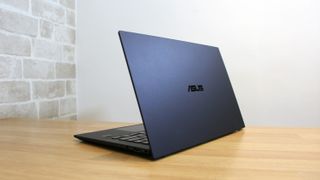
This laptop looks the part, too, with a subtly sandblasted finish that appears either grey or dark navy depending on how it catches the light. It’s smart, impressive, and boardroom-ready. The edges are a little too sharp, and the rubber feet aren’t grippy enough – but they’re tiny quibbles.
The £1,083 exc VAT Acer TravelMate P6 is heavier and thicker than the Asus, but it’s weaker with poorer aesthetics. The Apple MacBook Air and Dell XPS 13 are heavier, meanwhile, but both look better and are a little more robust.
Asus ExpertBook B9450F review: Keyboard and trackpad
As usual on smaller machines, the Asus’ keyboard has no numberpad. And, as usual, the layout is mixed – the Return key is only single-height, the power button is irritatingly included in the top-right corner and there are no separate Page Up, Page Down, Home or End buttons. Happily, the function row has dedicated buttons for taking screenshots, deactivating the webcam, and locking the PC.
The keyboard itself is excellent once you start typing. The buttons are tactile and comfortable, with a clear actuation point and a solid base. The action is fast, quiet and snappy, and crucially, it feels reliable. There’s a little more travel here than on rivals, and the Asus isn’t short of the MacBook and XPS when it comes to quality. The font is large and clear, and the backlight is bright and even, although it does leak from beneath the keys a little too much.
The trackpad is wide and smooth with two fast, shallow buttons. It also doubles as a numberpad - tapping the top-right corner of the pad superimposes a virtual numberpad over the top of the trackpad. You can use the numberpad and trackpad simultaneously - the pad’s scrolling and clicking functionality is retained while lightly tapping the glass surface registers number-presses. It’s a useful addition.
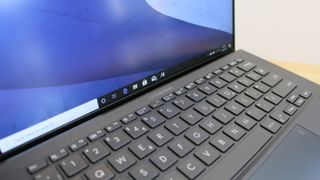
Asus ExpertBook B9450F review: Display
The Asus has a 14in 1080p IPS display, but if you were hoping for anything more, you’re out of luck: it’s not a touchscreen and no higher-resolution options are available.
Nevertheless, quality levels are excellent. The display’s brightness level of 334cd/m2 is ample for indoor use and for most outdoor scenarios. The black point of 0.18cd/m2 is impressively deep, and they create a superb contrast ratio of 1,856:1. The Asus has superb vibrancy and depth, and deftly renders subtle colour differences.
The Delta E of 0.82 is fantastic, the colour temperature of 6,638K is top-notch and the sRGB coverage level of 97.3% is great. This display is easily good enough for photo and media viewing and for mainstream photo-editing. It doesn’t have the ability to work in Adobe RGB or DCI-P3 colour spaces, though.
This panel is comfortably better than Acer’s effort. Stronger competition comes from Dell and Apple: the XPS has a brighter Full HD display and a 4K option, and the MacBook’s panel is both crisper and DCI-P3 capable.
Asus ExpertBook B9450F review: Hardware and performance
The ExpertBook uses an Intel Core i7-10510U, which has four Hyper-Threaded cores alongside base and boost speeds of 1.8GHz and 4.9GHz. It uses Intel’s UHD Graphics 620, and it’s joined by 8GB of dual-channel LPDDR3 memory, as well as a 512GB Samsung PM981 SSD with great read and write speeds of 3,514MB/sec and 1,954MB/sec.
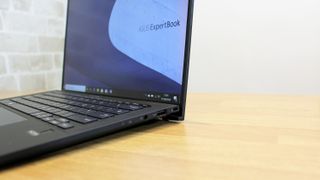
The 14nm CPU looks underwhelming when compared to hardware found elsewhere – the cheaper Acer paired the same CPU with discrete Nvidia graphics, and Apple and Dell’s machines each use newer 10nm chips. To get an XPS 13 with a specification to match the Asus, you’ll only have to pay £1,249 exc VAT; for a MacBook Air, it’s £1,207 exc VAT.
Unsurprisingly, the 14nm CPU is only middling in terms of performance. The Asus’ overall benchmark score of 74 is two points behind the Acer and miles behind the 89 scored by the Dell. In Geekbench 5, the Asus scored 1,192 and 2,839 for single and multi-core tasks – both of which were slower than the Acer and the Core i7 MacBook.
The integrated graphics core is also weak. In the basic 3D Mark Cloud Gate benchmark, the Asus scored 7,146 points, but the Intel Iris Plus core used by Dell and Apple scores around 12,500 points, and the Acer’s low-end Nvidia core scores around 13,000 points.
The ExpertBook won’t be breaking any speed records then, but the SSD keeps the OS feeling snappy and the CPU can handle everyday workloads like Office applications, browsers with loads of open tabs and some light photo-editing. The Acer, Dell and Apple machines are all faster, though, with more mainstream speed and multi-tasking ability.
The Asus isn’t flawless in thermal tests, either. When the CPU is taxed with tougher work applications it throttles to its base speed of 1.8GHz, but running a stress-test saw the speed drop to 1.5GHz - which is no surprise given the CPU temperature can reach 98 degrees in tough workloads. It’s not a recipe for peak performance, but it makes sense given the wider context – the throttling means that the exterior remains cool and quiet, with only a little warmth making its way to the underside.
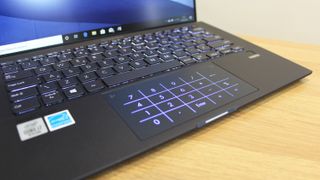
The Asus doesn’t deliver when it comes to pure speed, but it does have market-leading battery life. In our video playback test with the display at 170cd/m2 the Asus lasted for a mighty 22 hrs and 6 mins, and activating wireless internet only saw its test results drop by an hour. You’re easily going to manage a full day of use from this machine, from dawn to dusk – if you’re careful, it’ll make it through two workdays.
No rival can come anywhere close to competing. The Acer’s best results was fourteen hours, while the Dell lasted for eleven hours and the Apple was shorter still. What’s flabbergasting is that all of the above results were what we’d previously consider to be quite good - which just goes to show how ahead of the curve the ExpertBook is.
Asus ExpertBook B9450F review: Ports and features
The Asus has a full-size USB 3.1 Gen 2 port and two USB 3.1 Gen Type-C ports, with both supporting Thunderbolt 3 and one handling 65W charging. There’s one HDMI 2.0 output, a 3.5mm audio jack, a Kensington Lock slot and a micro-HDMI port that’s used with the included Gigabit Ethernet adapter. On the inside, the Asus has dual-band Wi-Fi 6 and Bluetooth 5.0.
On the security side, the Asus has a fingerprint reader and TPM 2.0 chip, and its webcam has a privacy cover and IR for Windows Hello compatibility. The 0.9mp camera doesn’t have outstanding quality, but it’s fine for office calls. Happily, there’s not much bloatware – McAfee Personal Security is installed, but that’s it, and Asus’ Business Manager app has useful options for locking ports, encrypting drives and shredding files.
The speakers are decent. There isn’t much bass, but the mid-range is well-defined, and the top-end is crisp. For music and YouTube videos, it’s easily good enough.
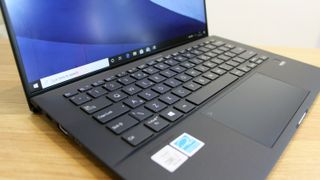
The Asus doesn’t have a card reader or Intel vPro, and there’s no potential support for SIM cards or NFC – and these business-friendly features can be included as optional extras on the Acer.
The Dell has no full-size USB ports, no HDMI and no Ethernet, while Apple’s machine only has two Thunderbolt 3/USB-C ports. The only competitor to come close is the Acer, which had better USB connectivity, a card reader and more optional extras.
Asus ExpertBook B9450F review: Verdict
The Asus ExpertBook B9450F is extremely strong in several vital departments. Its battery life is simply sensational, and this machine’s extreme longevity is joined by a great screen, a superb keyboard and slim, light design that’s going to be able to withstand busy commutes and frequent travel. It’s even got a solid selection of ports and decent speakers.
You can’t have everything, though, and to that end the Asus does fall behind in some areas. Its performance levels are fine for everyday computing, but it’s easy to find more grunt. Some other laptops have more ports and features, too, and there’s no 4K display option. The Asus is pricier than its competitors too.
The price difference isn’t too large, though, and it’s certainly worth paying the extra if you need a robust, light laptop that’s got the stamina to survive long work days. The ExpertBook is an excellent example of a long-lasting ultraportable.
Asus ExpertBook B9450F specifications
| Processor | 1.8GHz Intel Core i7-10510U |
| RAM | 8GB LPDDR3 |
| Graphics | Intel UHD Graphics 620 |
| Storage | 512GB Samsung PM981 SSD |
| Display | 14in 1,920 x 1,080 IPS |
| Operating System | Windows 10 Home 64-bit |
| Connectivity | Dual-band 802.11ax WiFi, Bluetooth 5.0, Gigabit Ethernet |
| Ports | 2 x USB 3.1 Gen 2 Type-C/Thunderbolt, 1 x USB 3.1 Gen 2 Type-A, 1 x HDMI, 1 x micro HDMI, 1 x audio |
| Dimensions | 320 x 203 x 14.9mm (WxDxH) |
| Weight | 995g |
| Warranty | 1yr RTB |
Mike Jennings has worked as a technology journalist for more than a decade and has been fascinated by computers since childhood, when he spent far too long building terrible websites. He loves desktop PCs, components, laptops and anything to do with the latest hardware.
Mike worked as a staff writer at PC Pro magazine in London for seven years, and during that time wrote for a variety of other tech titles, including Custom PC, Micro Mart and Computer Shopper. Since 2013, he’s been a freelance tech writer, and writes regularly for titles like Wired, TechRadar, Stuff, TechSpot, IT Pro, TrustedReviews and TechAdvisor. He still loves tech and covers everything from the latest business hardware and software to high-end gaming gear, and you’ll find him on plenty of sites writing reviews, features and guides on a vast range of topics.
You can email Mike at mike@mike-jennings.net, or find him on Twitter at @mikejjennings
